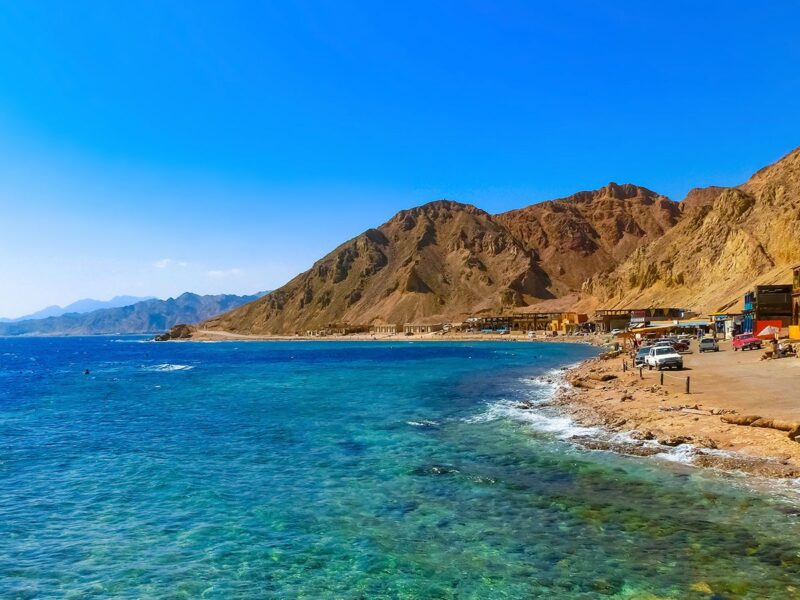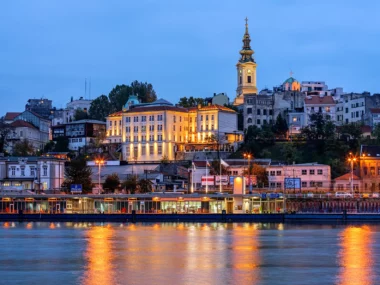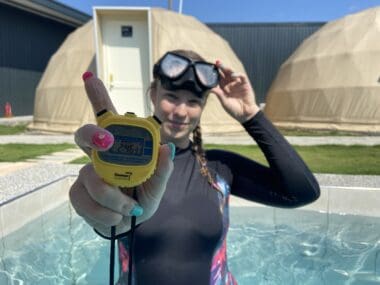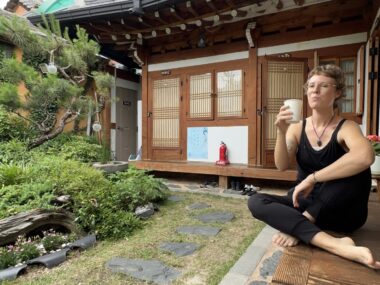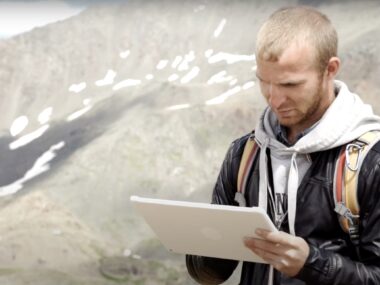
You know how some places sound great on paper, but in person they just don’t make you feel anything in particular–while other places make you feel more than you could ever have expected? For me, Dahab, Egypt was the latter.
I first heard about Dahab almost 14 years ago on my first ever big solo trip, in India. My first three travel buddies on that trip had just arrived after visiting Dahab, Egypt, and they spoke emphatically of it. Dahab became fixed in my head with the allure of a faraway, mysterious land.
Over the years I planned multiple trips there–but each time, the plan would be canceled at the last minute due to circumstances beyond my control. As such, Dahab retained its mythical status in my imagination. That is, until Spring 2023, thirteen years after first hearing about Dahab. The finally stars aligned or the red sea parted or whatever, and I finally found myself taking the plunge and moving to Dahab.
What Makes Dahab Special
Before living in Dahab, I’d lived in 11 different countries. Dahab was different enough to feel truly unique on a range of fronts, from its natural features and the people who inhabit it to the diversity of activities to the wildlife and more.
Landscape and Seascape
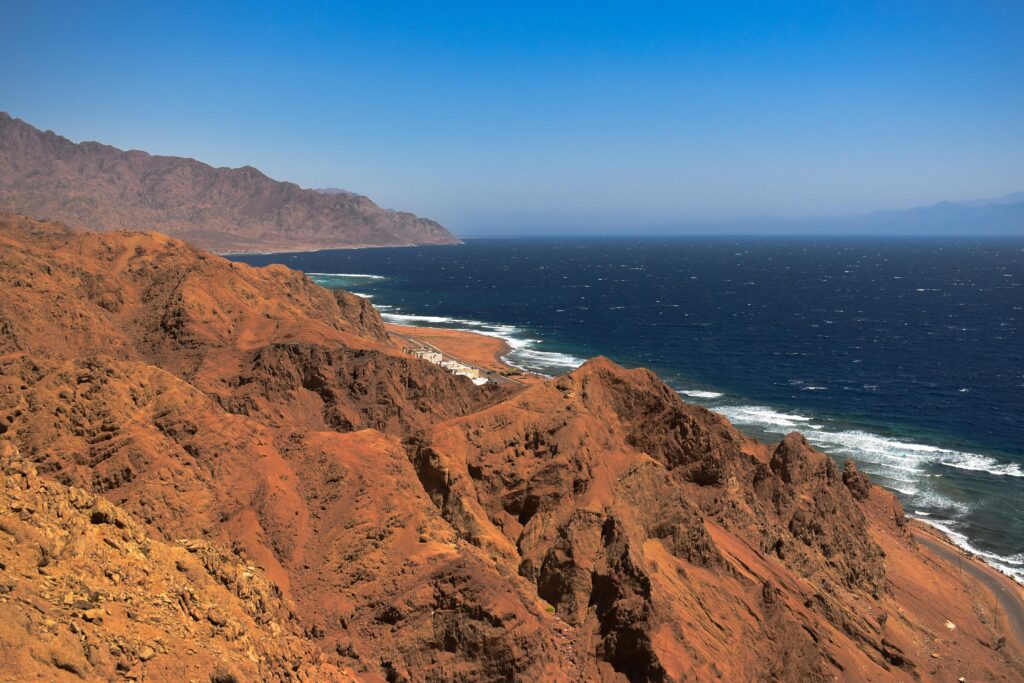
Dahab is perched on the Red Sea, and when you walk along the promenade by the water, you see pointy, majestic desert mountains behind you and the underwater world spread out in front of you. At almost any point along the shore you can walk in with your snorkel and a find world-class array of undersea life–coral mountains galore, bright-colored tropical fish, and a whole range of strange and puzzling creatures. And if you get bored of the sea, there’s an endless expanse of desert valleys, mountains galore, and rocks to climb waiting to be explored.
Bedouin Culture
Since the town is in Egypt’s Sinai peninsula, the true locals are the Bedouins who have been living there longer than anyone else. Bedouins tend to consider themselves a separate group rather than identifying with their Egyptian counterparts.
Formerly nomadic, most of today’s bedouins have settled in small towns across Egypt’s Sinai, Israel, and Jordan, but they are fiercely collectivist and retain a unique set of customs and values. For example, when a conflict or crime occurs within the Bedouin community, they don’t go to the police. Instead, they seek counsel from the local sheikh, which roughly translates to ‘tribal and spiritual leader and mentor’.
The first apartment I rented in Dahab was in a multi-generational Bedouin house. As people from a very group-oriented culture, they immediately and easily treated me like one of their own. They would routinely invite me in to drink tea and coffee with them. Their kids would knock on my door and play in my living room while I cooked, my female peers would borrow my earrings and ask my opinion on dresses, and whenever I would go out on my balcony at night, I’d see them lying down to sleep in the yard below (something that was a choice rather an a necessity).
Wildlife Around Town
In some parts of town, including areas where digital nomads live, it’s quite normal that not all of your neighbors are human. Sure, there are the regular village animals like chickens, but there are also herds of goats filling some of the streets and camels in empty lots here and there. I made friends with a camel standing alone in one lot and used to stop by on my midnight walks to feed her expired guavas, which she loved. Sometimes her Bedouin owner was there, sleeping outside a few meters away.
Pro Tip: Save your fruit and vegetables peels and skins and feed them to the goats to instantly make dozens of four-legged friends. But also, be careful when walking back from the grocery store with fresh food in your bag. The goats will follow you and sniff your bag. Aggressively.
Above: Bedouin man with his camel on the path to Mount Sinai, near Dahab.
Digital Nomad Community
In most places I’ve done the digital nomad thing, it’s normal for foreigners and locals to be cordial and friendly but somewhat separate. Dahab is the only place I’ve ever lived where around half of the digital nomad community was comprised of local Egyptians from other parts of the country. Most of them had more progressive values than the average, so they were opting out of traditional life to come live and work from the little liberal bubble that is Dahab. As a result, I had more interaction with the cultures of my host country in Dahab than in any of the other 30-something countries I’ve visited.
Above: Digital Nomad Dinner, Autumn 2023.
Variety of Communities
Another thing that makes Dahab unique, I discovered, is the fact that it’s not known for one particular ‘thing,’ but many—despite being a town of only a few thousand people. It’s a renowned water sports destination, particularly for windsurfers, scuba divers, and free divers. It’s a total hippie haven for spiritual seekers, artists, and 420-friendly chillaxers. It even has a thriving Latin dance community, with dancers at a surprisingly high level for such a small town, and dance events every night.
Islamic Backdrop
Although Dahab is indeed a little international bubble, it’s still in a Muslim country with Islamic values. During Ramadan, the streets come alive with special delicacies after sundown, and every day, multiple times a day year-round, you can hear the hauntingly beautiful call to prayer, or Adan, echoing through the various mosques around town.
Some Egyptians who move to Dahab to work remotely are either not religious or are questioning their religious upbringings, while others are strict Muslims. Many are happy to share their beliefs or lack thereof, leading to quite a lot of interesting (albeit occasionally heated) conversations.
What’s Not to Like?
Of course, not everything in Dahab is sunshine and rainbows. Here are a few things to prepare yourself for if you do end up going over there.
Informant Culture
Yep, that’s right. Informant culture is strong in Egypt. Many people are collaborating with the police as informants, which means that they may quite literally be watching you and reporting your activities back to the police if they suspect that you’re involved in any funny business. As a Jewish American with a second passport from Israel, this was a particularly sensitive situation.
Cross-border relationships in tense regions often face unique challenges. One Israeli-Egyptian couple experienced this when local authorities stormed their home, assaulted the Egyptian partner, and expelled him from Sinai. Undeterred, he bribed a guard and trekked over mountains to be with her again. In a similar case, an Egyptian dating an Israeli endured police interrogation, and his partner was later denied entry to Sinai.
Even casual mentions of Israel can spark scrutiny; a man was questioned in a restaurant after referencing Israel on a call, and a Jewish friend organizing cultural events was suddenly barred from re-entering Egypt. These stories highlight the personal toll that political divides can have on those simply seeking connection.
While Jews and Israelis are the group most likely to be watched, informants can and will snoop on anyone and everyone. Foreigners in relationships with Egyptians should be particularly cautious; sex before marriage is illegal in Egypt, so Egyptians can sometimes get in trouble for staying the night with a female companion. This rule is also enforced by many landlords. I made a deal with my landlord that my Egyptian boyfriend was allowed to stay until midnight, but then he had to leave. There were cameras by the entrance of the house, so we had to comply.
Things Not Functioning
In Dahab, life comes with a few quirks: water tanks run empty every week or two, requiring a call to the landlord to arrange a refill; electricity can go out for hours—even in scorching 40°C heat; and things around the house may break, with repairs covered or not by the landlord (though often affordable). Many systems move slowly, so it’s best to accept these rhythms rather than expect the same efficiency you might be used to elsewhere.
Bedouin Children Driving
Bedouin children under 10 sometimes drive pickup trucks, and occasionally they crash into people, since they are children—so take care when walking around, particularly in Assalah near the busy Assalah Square area.
Once, in a less populated area, my taxi was driven by a 14-year-old Bedouin boy who operated the pedals, while his 6-year-old brother sat on his lap and operated the steering wheel. Another time, I was enlisted to drive the public taxi boat part of the way back to Dahab (no, I don’t know how to drive a boat, and yes, I did it). Suffice it to say that driving rules are more lax here, making for a not-always-safe environment.
Above: My (very) underage taxi driver duo, ages 14 and 6.
For me, the upsides of life in Dahab were absolutely well worth the occasional (ok, frequent) inconveniences that can occur in the developing world, by a long shot.
Neighborhoods and Internet Connectivity Around Town
Although Dahab is small enough to be very walkable, each neighborhood has a unique flavor. Also, the best mobile data service varies by neighborhood.
Assalah: This is my favorite neighborhood; it tends to be cheaper than others, and it feels the most local, although many digital nomads live there. It’s also the neighborhood where you’ll encounter the most dirt roads and goats walking around. The best internet provider to use in most of Assalah is Etisalat.
Lighthouse: This area is the heart of digital nomad/expat life and activities in Dahab. All of Lighthouse is near the sea, and it’s a very central neighborhood. Etisalat is also the fastest internet provider in this neighborhood.
Mashraba: Located towards the southern end of Dahab, Mashraba is tourist central. Many short-term Egyptian as well as Israeli tourists stay there. It’s actually the best area for living; it’s a little more developed-feeling than Assalah, the living areas are quieter, it’s also somewhat cheaper, and the electricity goes out much less frequently. Oddly, digital nomads usually choose to live in other parts of town, despite the fact that Mashraba offers the best setup for them. WE is the fastest internet provider in this neighborhood.
Lagona: This is where the kitesurfers and windsurfers usually live. Accommodation here tends to be more hotel and resort-like rather than local-feeling, and there isn’t a lot going on in this neighborhood other than being a residential area plus a place for wind sports.
Housing Prices:
In 2023, I paid around $300 per month for a newly-renovated, two-bedroom apartment with two balconies and a good living room for hosting friends. It was about a 5-minute walk from the sea. Apartments right on the sea went for around $1,000, while apartments further back in the town, around a 10-15 minute walk from the sea, could be found for $200 and sometimes even less. That said, I’m told that prices have been increasing lately, so expect to pay a little bit more than these estimates nowadays.
Above: My living room, with space to host plenty of friends. Faces of Egyptian friends blurred to protect them.
How to Get Involved in Digital Nomad Community
If you’re interested in living the Dahab digital nomad life, join the WhatsApp group here. It’s very active and is full of event invitations, chatting, and opportunities to connect. I admin this group together with a couple of friends; when I joined, it was around 135 people, and within 6 months, it had ballooned to over 700—a testament to Dahab’s somewhat explosive emergence into the worldwide digital nomad scene.
You should also check out the Dahab Digital Nomad Hacks document to get lots more relevant information and access links to other Dahab WhatsApp chats, organized by interests and activities. You can also visit El Coworking, Dahab’s first real coworking space (with gorgeous ocean views and beanbags!). And to really get stuck into the community, attend or perform at open mic night at Tota every Tuesday evening at 7:30.
In writing this article, I talked with a friend about what was memorable from his time in Dahab. He thought for a moment and then told me something he came up with while sitting silently in the desert: he described Dahab as a place “where a desert oasis meets a deep sense of humanity.” I think he’s right, but you’ll have to go see for yourself in order to understand what that really means.
In the end, Dahab turned out to be even more amazing than I’d imagined all those years ago. The mix of stunning landscapes, the welcoming Bedouin culture, and the vibrant digital nomad scene made every day an adventure. Sure, there were some quirks and inconveniences, but they were a small price to pay for the overall experience. Dahab isn’t just a place you visit; it’s a place that leaves a mark on you. If you’re looking for somewhere that feels like a hidden gem, Dahab is definitely worth the journey.
For more travel stories like this check out, Olivia’s article on Hiking the Kalalau Trail!

